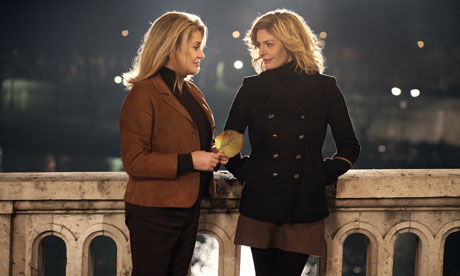Writer/director Christophe Honore and composer Alex Beaupain
continue to reinvent the movie musical with "Beloved," a companion
piece to their "Love Songs" (2008). No one else in the world is doing
what they're doing. They may not be great artists, but they are certainly good
ones. When they're at their best, they produce cinema moments that are nothing
short of sublime.
In "Beloved" there also is the added delight of
seeing the real-life mother-and-daughter team of Catherine Deneuve and Chiara
Mastroianni (shown here) on screen together for what I think is the first time -- and
playing a mother and daughter! Masterful casting.
One can't help but think of Marcello Mastroianni either
(Chiara's late father), who seems to be lurking around every corner -- and
through him, of course, Federico Fellini. And it gets better. The man playing
Chiara's father is none other than Milos Forman. Yes, THE Milos Forman
("Amadeus"). The casting is almost too inspired. It threatens to
drown the film in nostalgia for the halcyon days of European cinema.
Representing young Europe are, in addition to Mastroianni,
Louis Garrel and Ludivine Sagnier. Sagnier plays the main character in her youth: a prostitute
in 1960s Paris who falls in love with and marries a Czech doctor. In her later
years, she's played by a still-randy Deneuve. Forman (who in real life is
Czech) plays the Czech doctor in his later years. Mastroianni plays their
daughter.
Garrel plays Mastroianni's on-and-off boyfriend.
Moving things in a really different direction (and bringing
America into the mix) is an American played by Paul Schneider, a gay man who
has a boundary-breaking hard-to-define romance of sorts with Mastroianni.
I know what you're thinking: too many characters. It's true. The film does get overblown with
confusing inter-relationships, and I haven't even explained all of them. The film is also not edited well and too long (2 hours and
10 minutes).
"Beloved" is a musical kaleidoscope of love. At times,
it's a sloppy mess. But at times it beautifully captures 21st-century love, in
all its shape-shifting glory. Name one interesting person in a big city today
who has a standard relationship that perfectly fits into the box of
marital fidelity or even sexual orientation. I'm a gay man, and my greatest
loves in the 21st century have been with either single straight men or married
straight women. Complexities abound.
As I was just remarking in a review of Oliver Stone's
"Savages," the human species is evolving at lightning speed. We're
reinventing love in a fearless and exhilarating way. Honore revels in this and
throws us into the euphoric thrum of it all. But it's
not all glee. One character commits suicide. The breakdown of sexual
orientation and bourgeois forms of relationship comes at a price. It can be
profoundly disconcerting. When you love someone outside your sexual orientation, you go home alone most of the time -- both of you. Both of you know that
you're loved, but you don't have each other to hold onto in bed.
Making it even more complicated, the person who IS in your
bed knows your real love is someone else. Radical forms of love are not for the
weak.
It is flawed, but "Beloved" is also a wonder: a
joyful but conflicted embrace of the future.
Did I mention the music of "Beloved"? At times it is exquisite.


No comments:
Post a Comment